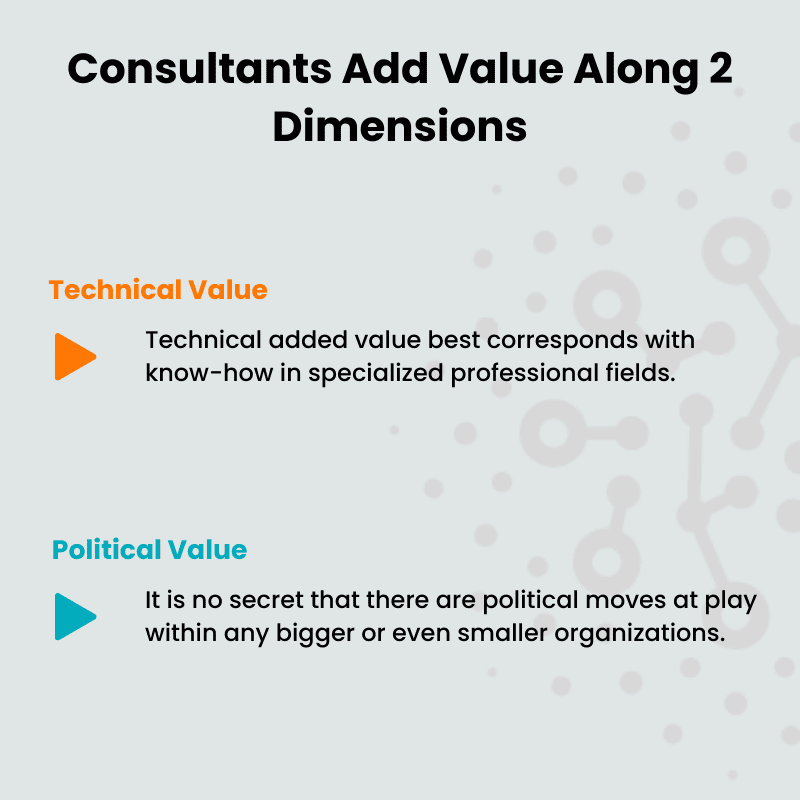In the business world, hiring consultants has become a go-to strategy for deriving substantial value from consulting. It’s more than just an external voice offering a new perspective; it’s about collaboration, aiming for peak results. But here’s the crux: the true essence of consulting lies in the value it brings to the table.
When businesses invest in consultants, they’re not just paying for expertise—they’re investing in tangible, beneficial results and extracting maximum value from consulting. So how can businesses ensure they’re extracting the most value from these partnerships?
The answer is twofold: first, by partnering with consultants who are not just skilled but are truly passionate about their craft; and second, by fully understanding and monitoring the value that these professionals bring to the organization.
A. The Transformative Power of Passion in Consulting
E.M. Forster once keenly remarked, “One person with passion is better than 40 people merely interested.”
In the world of business, whether you’re a fledgling start-up or a well-established conglomerate, the passion and dedication of your allies matter, especially when those allies are consultants. Here’s why:
1. Choosing a Consultant: Beyond the Resume
When you embark on the journey of hiring a consultant, their CV tells you about their skills and expertise, but it’s their inherent passion and unwavering commitment that will truly redefine the trajectory of your project.
A consultant’s fervor isn’t just about an innate love for their field, but also a dedication to continuous learning and adaptability. Every niche has its depths, and a consultant’s enthusiasm ensures they dive deep, staying updated, evolving, and bringing the latest insights to your project.
2. Passion as the Ultimate Problem Solver
No project, no matter how meticulously planned, is immune to unforeseen challenges. The unpredictable nature of life, and indeed business, ensures obstacles will arise.
Here, a consultant’s passion plays a pivotal role. Their drive, an innate result of their passion, means they won’t just find solutions; they’ll innovate and persist, ensuring your project doesn’t just navigate challenges but thrives amidst them.
This drive is not merely about facing challenges head-on; it’s about elevating performance, pushing boundaries, and redefining excellence.
3. The Impact on Results: Passion’s Tangible Outcomes
In the realm of consulting, the real measure of success is the tangible outcomes produced. When a consultant is genuinely in love with what they do and the project they’re part of, they don’t just aim to meet targets, they aim to exceed them.
This love for the job, fueled by passion, propels projects to new heights. The mindset it fosters, that of champions, is what truly differentiates a satisfactory outcome from an outstanding one.
While expertise and experience form the bedrock of any consulting venture, it’s the intangible quality of passion that serves as the catalyst, accelerating projects towards unparalleled success.
B. Understanding the Value from Consulting Created by Consultants
Many companies often perceive consulting merely as an additional resource, primarily through the lens of the project they are currently working on.
Unfortunately, this limited perspective means that few executives truly appreciate the full value from consulting professionals.
To shed light on this issue, it’s essential to recognize that the value from consulting can be broadly categorized into two main categories: Technical and Political.

1. Technical Value
Technical added value best corresponds with know-how in specialized professional fields. A seasoned expert in their area has decades of experience and can undoubtedly provide great benefits by working for your organization.
- Providing Outside Knowledge – Derived from the wealth of their professional experience, Consultants possess rich information on customers, products, markets, and competitors. They can perform surveys, reach out to experts, and leverage their analytical power in ways unaccessible to clients. Indeed, the more consultants are specialized, the higher the chances they have faced similar issues or worked on adjacent problems. They provide a benchmark, state of the art elements, and perform maturity assessments.
- Accurate Problem Diagnosing a Problem and Solutions – Often, the problem an organization struggles with, is how they ‘see’ the problem. Misdiagnosed problems will further complicate the situation. And often lead the team in the wrong direction. Finding a solution being therefore much more time-consuming and expensive.
- Ability to frame and analyze an issue leads to structured problem solving and accurate and effective recommendations. A Consultant will normally gather, analyze treasure trove of information, and present it in a way that enables Executives to make effective and optimal decisions for the company.
- Assistance in the implementation of a solution – Consultants can successfully offer help with facilitating the generation of a capability improvement roadmap as well as Securing/Accelerating the execution – Projects Management; Additional dedicated resources; Increased expertise level are all elements of the execution which is the crucial stage to achieve the expected impact.
- Audit of management practices – that includes analyzing performance; adherence to processes and policies; and also providing an independent assessment.
2. Political Value
In any organization, regardless of how big or small it is, there is always politics and political games at play. That, unfortunately, can create tension, and cause friction between various interests, departments, groups or individuals.
And Executives are especially affected by these dynamics. Consultants, however, can effectively contribute to smoother processes, introduction, and facilitation of new measures, and much more.
- Providing legitimacy of decisions – Consultants often can be used as a scapegoat in situations where the solution of a problem requires it. An Executive can justify a decision in question, and have the Consultant take the blame in case something goes wrong. It provides relief for the Management team and mimics the famous crime drama plot with the Consultant taking the ‘bad cop role’ to execute painful decisions.
- Facilitating the convergence between stakeholders on a variety of issues and decisions – analyzing a situation, building alignment and improving relationships among key stakeholders, and improving decision-making process, can yield great benefits.
- Acting as a Trusted Advisor – Playing a sounding board role to bounce ideas off of when CEOs can’t discuss them with their teams, is a valuable practice. It might feel lonely at the top as CEOs cannot share everything with their Leadership team. Besides, the Trusted advisor will not have an agenda and can provide an unbiased second opinion.
- Enforcing unpopular changes – Cost cutting projects or restructuring are a great example. Those can, of course, be led internally, but it can be difficult to find volunteers to be the executioner of tough decisions or to be the one recommending to cut this or that part of the workforce.
C. How to Best Measure the Value Created?
Having established an understanding of the two types of values consultants bring, it’s crucial to navigate the next step – measurement. True value isn’t just about numbers; it’s the synthesis of both tangible outcomes and the subtle, intangible shifts that mold a company’s future trajectory.
But how do we capture these nuances effectively? How do we balance the evident with the less visible?
1. Tangible Benefits
Tangible benefits have a direct impact on the P&L. They are easier to measure since they can often be evaluated in numbers.
Increasing revenues: The work done with your Consulting Provider can improve your top-line with more Sales, better sales margins, or increase in market share.
Reducing costs: The Consulting project can also have a positive impact on your costs, both direct and indirect through improved efficiency, better organized and sourced purchasing, and more.
Avoiding Costs (or avoiding future waste): It is a more complicated evaluation. However, it is often possible to calculate the avoidance of cost due to an improvement in reliability, a better focus, or a Capacity increase (assets and workforce expansion).
Improving Cash/Working capital: Finally, financial measures such as cash and work capital improvement can also be considered as benefits from a consulting project, for instance, inventory usage and management, improved and optimized Payment terms, development of better Financing options and payment/credit terms.
2. Intangible Benefits
With no obvious method to date, it’s easier to identify tangible P&L impacts. But there are other fields where subjective or intangible dimensions are measured. HR is an excellent example, with employee engagement, for instance.
Culture, Diversity & Inclusion, Talent management: There are numerous examples in management literature of how a new culture has improved innovation, how diversity and inclusion lead to better decision-making or how an efficient talent management system can help bring in and retain stellar individuals. All these results have an impact on the performance of your company, and on the value created by your team, even though it is difficult to quantify it precisely.
Process and Systems Optimization: In the same way, optimizing your processes and systems can only lead you to serve your clients better, and thus create more value for your company. For instance, gaining a half-day on a 5-day process can allow you to serve 10% more clients with sane resources, which has a direct impact on your top-line, and little on your costs.
The long-term impact of the transformation program on the value of the company: If you launch a transformation program that moves an organization from a commodity player valued at x7 EBITDA to a specialty player valued at x10 EBITDA, you have naturally created tremendous value for your company and your shareholders
Conclusion
Engaging with consultants is more than a mere transaction; it’s a strategic partnership aimed at fostering growth and innovation. While the deliverables and strategies they propose are vital, the ultimate test is the tangible and intangible value they contribute from consulting.
Every dollar spent on consulting should yield results that move the business forward, be it in terms of increased efficiency, profitability, or innovation.
Therefore, when businesses decide to bring consultants into their fold, they should prioritize those who genuinely love their work, bringing enthusiasm alongside expertise in extracting value from consulting.
Moreover, it’s equally essential for businesses to have mechanisms in place that allow them to see, measure, and appreciate the added value from consulting.
With these elements in focus, the journey with consultants becomes not just a business move, but a recipe for sustained success.
value from consulting value from consulting value from consulting value from consulting value from consulting
value from consulting value from consulting value from consulting value from consulting value from consulting
value from consulting value from consulting value from consulting value from consulting value from consulting

How Consource Can Help?
Consource facilitates seamless collaboration between consultants, clients, and stakeholders. Harness the collective expertise to make informed choices, drive successful projects, and maximize the value you derive from consulting services.








0 Comments